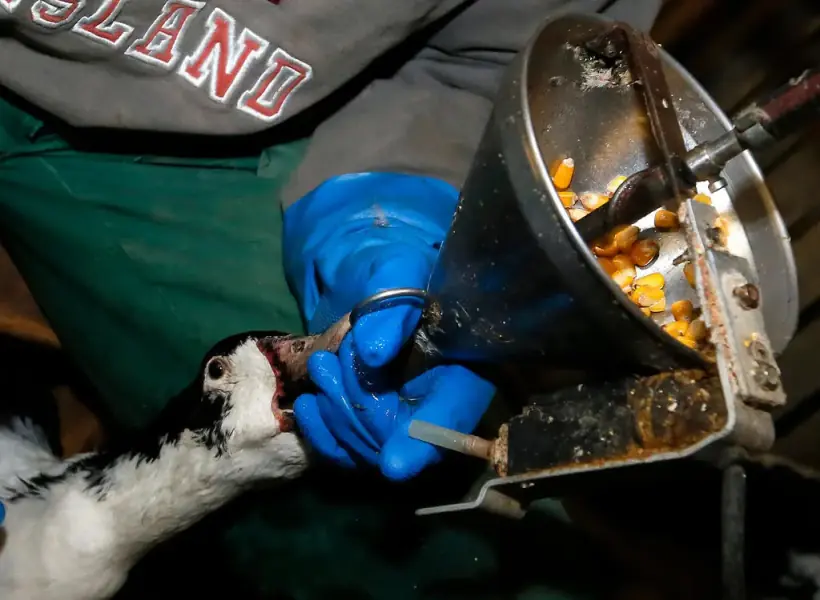The Cruel Trade: Force-Feeding for Profit, a Global Problem
The disturbing practice of force-feeding animals to artificially increase their weight before slaughter, recently uncovered in Guangxi, China, is not an isolated incident. This practice, driven by profit and often shrouded in secrecy, exists in various forms across different industries globally, raising serious ethical concerns and highlighting systemic failures in animal welfare.

The Mechanics of Cruelty in Sheep Farming:
In Guangxi, traders subject sheep to a brutal process euphemistically termed "maintenance". Workers insert tubes into the sheep's throats and use high pressure to pump 20-30 jin (approximately 10-15 kg or 22-33 lbs) of feed directly into their stomachs. This violent procedure often results in severe distress, injury, and even death. This practice is reportedly widespread in the region, with sources claiming it's nearly impossible to find sheep that have not been subjected to this treatment.
A Lack of Regulation and Oversight:
The sheep are transported and slaughtered without proper inspection and quarantine procedures, often in unsanitary and illegal slaughterhouses. This lack of oversight creates significant food safety risks and further exacerbates animal suffering.
Echoes of Cruelty: Force-Feeding in Other Industries:
The forced feeding of sheep in China shares disturbing similarities with other practices in animal agriculture around the world:
- Foie Gras Production: Perhaps the most well-known example of force-feeding is "gavage" in foie gras production. Ducks or geese are force-fed large quantities of grain through a tube inserted into their esophagus to enlarge their livers. This practice is highly controversial and has been banned in many countries due to animal welfare concerns. However, it remains legal and prevalent in regions like France, Hungary, Bulgaria, Spain, and the Walloon region of Belgium.
- Force-Feeding in Other Livestock: While less publicized, force-feeding or "overfeeding" can occur in other livestock industries as well. For example, some farmers may force-feed cattle or pigs to increase their weight before sale, particularly in situations where animals are being sold by weight. This can involve using similar techniques as in foie gras production or simply providing excessive amounts of feed in a short period.
- "Bulking" in Poultry: In the poultry industry, "bulking" refers to the practice of providing broiler chickens with feed and water at all times to maximize their growth rate. While not strictly force-feeding, this practice can lead to rapid growth and obesity, causing various health problems for the birds, such as skeletal disorders and heart failure.
Ethical and Welfare Implications:
All forms of force-feeding raise serious ethical and animal welfare concerns. These practices cause:
- Physical Suffering: Force-feeding can cause physical discomfort, pain, and injury, including damage to the esophagus, stomach rupture, and organ failure.
- Psychological Distress: Animals subjected to force-feeding experience stress, fear, and anxiety.
- Reduced Quality of Life: These practices significantly compromise the animals' well-being and natural behaviors.
A Global Call for Change:
The forced feeding of sheep in China, alongside similar practices in other industries, highlights a critical need for:
- Stronger Animal Welfare Laws: Countries need to enact and enforce stricter animal welfare laws that explicitly prohibit force-feeding and other cruel practices.
- Greater Transparency and Traceability: Increased transparency in the supply chain is essential to ensure that consumers can make informed choices about the products they buy.
- Consumer Awareness: Raising consumer awareness about these practices can help drive demand for more ethically sourced animal products.
- Industry Reform: Promoting more humane and sustainable farming practices is crucial to prevent future instances of animal cruelty.
The pursuit of profit should never come at the expense of animal welfare. It is imperative that we move towards a more compassionate and sustainable food system that respects the well-being of all living beings.
